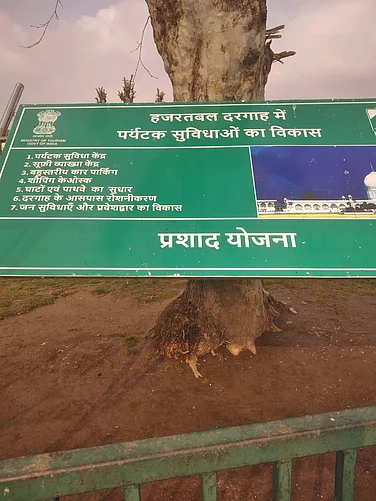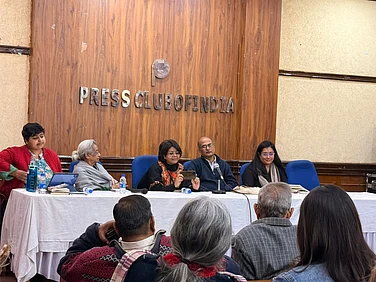This month seemed like an especially appropriate time to remind myself that as a species we’re likely programmed to respond to novelty: new things, variety in foods, unfamiliar destinations. Our predilection is symbolized every year by the countdown to a “new” year, with its promise, its illusion, of fresh departures -- an illusion all the more powerful when the vista is of a new century, or even a decade.
And where there is an illusion, there is also the potential for a scam. Such as the one currently being perpetrated in the political sphere where, especially since the 2009 Lok Sabha elections, the public has been bombarded with rhetoric and images to the effect that what we have is a new era in Indian politics; that the politics of caste, religion and regionalism is, somehow, outdated; and that what (that mythical beast known as) The People want is a politics premised on socio-economic development (or simply, Development). This new turn is best symbolized by the rise to prominence of younger, relatively fresh-faced political figures, who won’t simply turn the page but will bring down the curtain on the sort of politics India apparently can do without.
The script is an old one, and as with a formula film, it seems one doesn’t need to change much about the narrative. We are thus left with Great Indian Hopes like Omar Abdullah (hailed upon his election by an excited newscaster as “Kashmir’s Obama”), the son and grandson of state Chief Ministers; Supriya Sule (daughter of that permanent fixture of Maharashtra politics, Sharad Pawar); Agatha Sangma (daughter of former Lok Sabha speaker and NCP co-founder Purno Sangma); Sachin Pilot (son of the late Congress rising star Rajesh Pilot); and of course Rahul Gandhi (the son, grandson, and great-grandson of Indian Prime Ministers, and the great-great-grandson of one of the independence movement’s luminaries). In figures like these (whom, it must be admitted, this writer can probably relate to better than to some other politicians), we see that the promise of change that animates genuinely new political movements has been co-opted by a marketing ethos, for which change is simply a brand.
Overly harsh? Consider that none of the “new” faces in Indian politics, scions of established political families, have so much as promised any particular departure from the policies of their parents; the pious hope of newness is deemed enough. Thus Omar Abdullah promises a new start, but says not one thing that Farooq Abdullah wouldn’t have; thus the only specific things that anyone can point to with respect to Rahul Gandhi’s efforts to renew the Congress are a registration drive that has swelled the party’s numbers, talk of bringing younger faces into the party, and yatras to some of India’s dustier corners -- tactics that are not only as old as the hills, but specifically associated with the likes of Rajiv Gandhi and Nehru, almost as if the scion wanted to reassure us that his role is merely a reprise.
Nor should any of this be surprising: it would be truly remarkable (and perhaps suicidal) for those who owe their political position to dynastic privilege to bite the very hand that has raised them up. But it is the smugness of the illusion that rankles, the complacency that enables a political class and an often uncritical media to peddle these attempts to shore up the status quo as some kind of progressive step. And this complacency is not the result of a political or media failure, but of our failure, that is to say, of the “us” the political parties and television newscasts (especially the English-language ones) address.
Let’s not kid ourselves about the “new” focus on governance and “development”: the focus on technocratic competence as a substitute for politics, indeed, as the only legitimate aim of politics, is one of the Indian middle classes’ oldest opiates. A half-century ago, the bureaucracy was the vehicle for such technocratic competence; today, private enterprise lights our fire (and stokes our rage at the “Nehruvians” who have supposedly held the country back) -- but they are both sides of the same coin, content to try and bypass the messy realities and urgent claims of Indian politics, in favour of the illusion of consensus. (Where that illusion is rendered untenable, as with the ongoing Telengana and Gorkhaland agitations, gasps of incomprehension, followed by attempts to shoehorn the strange political animal into the familiar pen of statecraft and financial interests -- who mishandled what; whose property interests would be affected if (e.g.) Hyderabad were lost to Andhra Pradesh -- are the stock responses.) Surely, we comfort ourselves, we can all agree that the country needs better roads, better airports, a higher standard of living -- who could possibly be against that? (Lefties, if the comments I read are any indication; ah, those Evildoers.) Questions as to what is not being funded when better roads are, why isn’t there more money for India’s primary education system, and what to do about the fact that those who benefit from the new economic paradigm are often not the ones who are being displaced for it, remain unasked.
It is this desire for comfort, which is ultimately a desire for a politics that does not ask for any sacrifice, that does not make any demands save that we continue doing what we already have been doing, and that simultaneously preserves our self-image as citizens of a “new” world and era, that drives so much of these new/old political careers. The old hands in more than one political party have concluded that it is dangerous to tell the consumer that she cannot have her cake and eat it too, and who can blame them? They are familiar, the Rahul Gandhis and Omar Abdullahs (they are familiar even when they rebel, as Raj Thackeray reminds us), and flatter us by pandering to us. We repay the favour by pretending that we believe that something new and wondrous is being born. As with all pretences, the danger lies in mistaking the sham for the reality. It is a new decade, this 2010 (arguably: Outlook, for one, is not convinced), but it’s still the same world.
Umair Ahmed Muhajir is a lawyer based in New York City. He blogs at qalandari.blogspot.com





















